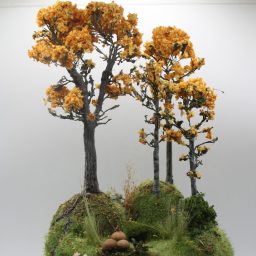

Imagination and Play
Makers craft miniature worlds that both draw on real life and are imbued with imagination and fantasy. Worldbuilding is not just something children do. It has significant value in adulthood as a form of social commentary, creativity and inventiveness. For some, miniatures offer them the opportunity to create things they do not have access to in real life. For others, it is a means of incorporating the fictitious and the fantastical. Creating alternative worlds forces people outside the bounds of everyday reality. In a similar vein, play relies on imagination, curiosity and openness, stretching the limits of what is possible. Play also often involves humour which is used as a way of realising new worlds through challenge and surprise.
A growing body of research highlights how worldbuilding and imaginative play have numerous health benefits for adults, ranging from relieving stress to cultivating moral values about how the world ‘could’ or ‘should’ be. Makers describe how they are addicted and obsessed with making miniature worlds. It is a thrilling and exciting antidote to the mundane, laborious and difficult demands of everyday life, offering acceptance, freedom and hope.
We need your consent to load the translations
We use a third-party service to translate the website content that may collect data about your activity. Please review the details in the privacy policy and accept the service to view the translations.

